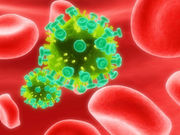Case report describes smoker with HIV infection receiving nivolumab for non-small-cell lung cancer
MONDAY, Dec. 4, 2017 (HealthDay News) — Nivolumab treatment for non-small-cell lung cancer may induce successful depletion of HIV reservoir, according to a letter to the editor published online Dec. 1 in the Annals of Oncology.
Amélie Guihot, M.D., from the Hôpital Pitié Salpêtrière in Paris, and colleagues describe the case of a 51-year-old smoker, who had HIV infection since 1995, and was diagnosed with stage IIIa non-small-cell lung cancer in May 2015. Less than six months after the end of adjuvant chemotherapy, relapse occurred and he was treated with nivolumab as a second-line agent in December 2016. The pre-treatment plasma HIV load was undetectable under emtricitabine, tenofovir, and dolutegravir.
The authors observed a progressive and modest increase in the plasma HIV load up to 101 copies/mL at 45 days, followed by a decrease to 31 copies/mL at day 120. A slight increase in T cell activation was seen between day 14 and 45, while decreases were seen in PD1 + CD4 and CD8 T cells at day 30. A marked increase was seen in the frequencies of HIV RT− and Nef-specific CD8 T cells from day 30 to 120. A drastic and persistent decrease was seen in the cell-associated HIV-DNA from 369 at day 0 to 30 copies per 106 cells at day 120.
“This first report of a successful depletion of the HIV reservoirs opens new therapeutic perspectives towards an HIV cure,” the authors write.
Several authors disclosed financial ties to the pharmaceutical industry.
Copyright © 2017 HealthDay. All rights reserved.








